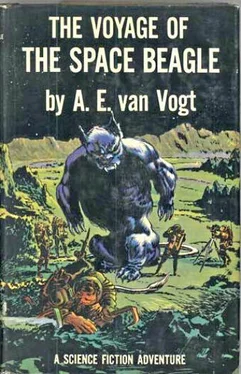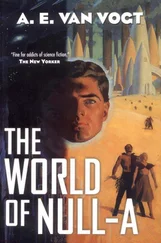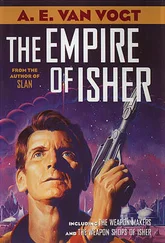Grosvenor whirled his machine into the nearest elevator and started down. He was beginning to let himself hope that he might find the control room deserted.
The hope died as he came to the main corridor. It swarmed with men. Barricades had been flung up, and there was an unmistakable odour of ozone. Vibrators fumed and fussed. Grosvenor peered cautiously out of the elevator, trying to size up the situation. It was visibly bad. The two approaches to the control room were blocked by scores of overturned loading mules. Behind them crouched men in military uniform. Grosvenor caught a glimpse of Captain Leeth among the defenders and, on the far side, he saw Director Morton behind the barricade of one of the attacking groups.
That clarified the picture. Suppressed hostility had been stimulated by the images. The scientists were fighting the military, whom they had always unconsciously hated. The military, in turn, was suddenly freed to vent its contempt and fury upon the despised scientists.
It was, Grosvenor knew, not a true picture of their feeling for each other. The human mind normally balanced innumerable opposing impulses so that the average individual might live his life span without letting one feeling gain important ascendance over the others. That intricate balance had now been upset. The result threatened disaster to an entire expedition of human beings, and promised victory to an enemy whose purpose could only be conjectured.
Whatever the reason, the way to the control room was blocked. Reluctantly, Grosvenor retreated again to his own department.
Korita met him at the door. “Look!” he said. He motioned to a wall-communicator plate, which was tuned to the finely balanced steering devices in the fore part of the Space Beagle. The sending plate there was focused directly along a series of hairline sights. The arrangement looked more intricate than it was. Grosvenor brought his eyes to the sights and saw that the ship was describing a slow curve which, at its climax, would bring it to bear directly on a bright white star. A servo mechanism had been set up to make periodic adjustments that would hold it on its course.
“Could the enemy do that?” Korita asked.
Grosvenor shook his head, more puzzled than alarmed. He shifted the viewer over to the bank of supplementary instruments. Accordingly to the star’s spectral type, magnitude, and luminosity, it was just over four light years distant. The ship’s speed was up to a light-year every five hours. Since it was still accelerating, that would increase on a calculable curve. He estimated roughly that the vessel would reach the vicinity of the sun in approximately eleven hours.
With a jerky movement, Grosvenor shut off the communicator. He stood there, shocked but not incredulous. Destruction could be the purpose of the deluded person who had altered the ship’s course. If so, there were just ten hours in which to prevent catastrophe.
Even at that moment, when he had no clear plan, it seemed to Grosvenor that only an attack on the enemy, using hypnotic techniques, would effectively do the job. Meanwhile….
He stood up decisively. It was time for a second attempt to get into the control room.
He needed something that would directly stimulate brain cells. There were several devices that could do that. Most of them were usable for medical purposes only. The exception was the encephalo-adjuster, an instrument that could be used to transmit impulses from one mind to another.
Even with Korita’s help, it took Grosvenor several minutes to set up one of his adjusters. Testing it consumed still more time; and, because it was such a delicate machine, he had to fasten it to his loading vehicle with a cushion of springs around it. Altogether, the preparation required thirty-seven minutes. He had a brief, though rather sharp, argument then with the archaeologist, who wanted to accompany him. In the end, however, Korita agreed to remain behind and guard their base of operations.
Carrying the encephalo-adjuster made it necessary for him to keep down the speed of his vehicle as he headed for the control room. The enforced slowdown irked him, but it also gave him an opportunity to observe the changes that had taken place since the first moment of attack.
He saw only an occasional unconscious body. Grosvenor guessed that most of the men who had fallen into deep trance sleeps had awakened spontaneously. Such awakenings were common hypnotic phenomena. Now they were responding to other stimuli on the same basis. Unfortunately — although it also was to be expected — that seemed to mean that long-suppressed impulses controlled their actions.
And so men who, under normal circumstances, merely disliked each other mildly had, in an instant, had their dislike change to murderous hatred.
The deadly factor was that they would be unaware of the change. For the mind could be taught without the individual’s knowing it. It could be tangled by bad environmental association, or by the attack that was now being made against a shipload of men. In either case, each person carried on as if his new beliefs were as soundly based as his old ones.
Grosvenor opened the elevator door on the control-room level, and then drew back hastily. A heat projector was pouring flame along the corridor. The metal walls burned with a harsh, sizzling sound. Within his narrow field of vision, three men lay dead. As he waited, there was a thunderous explosion. Instantly, the flames stopped. A blue smoke hazed the air, and there was a sense of suffocating heat. Within seconds, both the haze and the heat were gone. It was obvious that at least the ventilating system was still working.
He peered out cautiously. At first sight, the corridor seemed deserted. Then he saw Morton, half hidden in a protective alcove less than a score of feet away. At almost the same moment, the Director saw him and beckoned him over. Grosvenor hesitated, then realized he had to take the risk. He pushed his vehicle through the elevator doorway and darted across the intervening space. The Director greeted him eagerly as he came up.
“You’re just the man I wanted to see,” he said, “We’ve got to get control of the ship away from Captain Leeth before Kent and his group organize their attack.”
Morton’s gaze was calm and intelligent. He had the look of a man fighting for the right. Nor did it seem to occur to him that an explanation for his statement was required. The Director went on. “We’ll need your help particularly against Kent. They’re bringing up some chemical stuff I’ve never seen before. So far, our fans have blown it right back at them, but they’re setting up fans of their own. Our big problem is, will we have time to defeat Leeth before Kent can bring his forces to bear?”
Time was also Grosvenor’s problem. Unobtrusively, he brought his right hand up to his left wrist and touched the activating relay that controlled the directional-sending plates of the adjuster. He pointed the plates at Morton as he said. “I’ve got a plan, sir. I think it might be effective against the enemy.”
He stopped. Morton was looking down. The Director said, “You’ve brought along an adjuster, and it’s on. What do you expect from that?”
Grosvenor’s first tense reaction yielded to a need for a suitable answer. He had hoped that Morton would not be too familiar with adjusters. With that hope blasted, he could still try to use the instrument, though without the initial advantage of surprise. He said in a voice that was taut in spite of himself, “That’s it. It’s this machine I want to use.”
Morton hesitated, then said, “I gather from the thoughts coming into my mind that you’re broadcasting—” He stopped. Interest quickened his face. “Say,” he said presently, “that’s good. If you can put over the notion that we’re being attacked by aliens—”
Читать дальше











